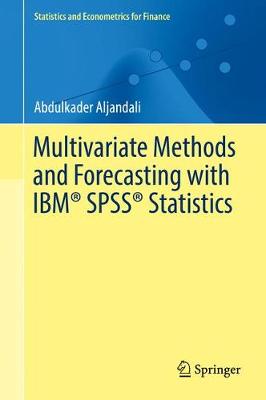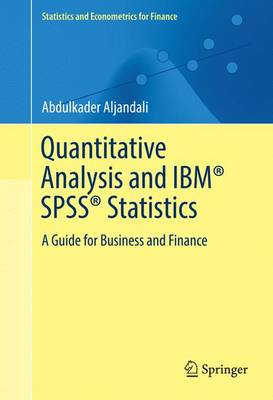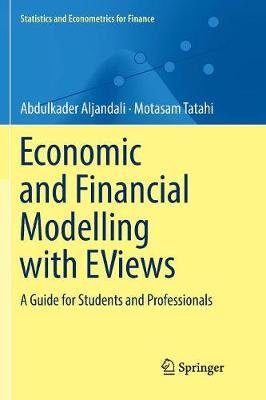Statistics and Econometrics for Finance
3 total works
Multivariate Methods and Forecasting with IBM (R) SPSS (R) Statistics
by Abdulkader Aljandali
Quantitative Analysis and IBM (R) SPSS (R) Statistics
by Abdulkader Aljandali
This guide is for practicing statisticians and data scientists who use IBM SPSS for statistical analysis of big data in business and finance. This is the first of a two-part guide to SPSS for Windows, introducing data entry into SPSS, along with elementary statistical and graphical methods for summarizing and presenting data. Part I also covers the rudiments of hypothesis testing and business forecasting while Part II will present multivariate statistical methods, more advanced forecasting methods, and multivariate methods.
IBM SPSS Statistics offers a powerful set of statistical and information analysis systems that run on a wide variety of personal computers. The software is built around routines that have been developed, tested, and widely used for more than 20 years. As such, IBM SPSS Statistics is extensively used in industry, commerce, banking, local and national governments, and education. Just a small subset of users of the package include the major clearing banks, the BBC, British Gas, British Airways, British Telecom, the Consumer Association, Eurotunnel, GSK, TfL, the NHS, Shell, Unilever, and W.H.S.
Although the emphasis in this guide is on applications of IBM SPSS Statistics, there is a need for users to be aware of the statistical assumptions and rationales underpinning correct and meaningful application of the techniques available in the package; therefore, such assumptions are discussed, and methods of assessing their validity are described. Also presented is the logic underlying the computation of the more commonly used test statistics in the area of hypothesis testing. Mathematical background is kept to a minimum.
Economic and Financial Modelling with EViews
by Abdulkader Aljandali and Motasam Tatahi
This practical guide in Eviews is aimed at practitioners and students in business, economics, econometrics, and finance. It uses a step-by-step approach to equip readers with a toolkit that enables them to make the most of this widely used econometric analysis software. Statistical and econometrics concepts are explained visually with examples, problems, and solutions.
Developed by economists, the Eviews statistical software package is used most commonly for time-series oriented econometric analysis. It allows users to quickly develop statistical relations from data and then use those relations to forecast future values of the data. The package provides convenient ways to enter or upload data series, create new series from existing ones, display and print series, carry out statistical analyses of relationships among series, and manipulate results and output. This highly hands-on resource includes more than 200 illustrative graphs and tables and tutorials throughout.
Abdulkader Aljandali is Senior Lecturer at Coventry University in London. He is currently leading the Stochastic Finance Module taught as part of the Global Financial Trading MSc. His previously published work includes Exchange Rate Volatility in Emerging Markers, Quantitative Analysis, Multivariate Methods & Forecasting with IBM SPSS Statistics and Multivariate Methods and Forecasting with IBM (R) SPSS (R) Statistics. Dr Aljandali is an established member of the British Accounting and Finance Association and the Higher Education Academy.
Motasam Tatahi is a specialist in the areas of Macroeconomics, Financial Economics, and Financial Econometrics at the European Business School, Regent's University London, where he serves as Principal Lecturer and Dissertation Coordinator for the MSc in Global Banking and Finance at The European Business School-London.


